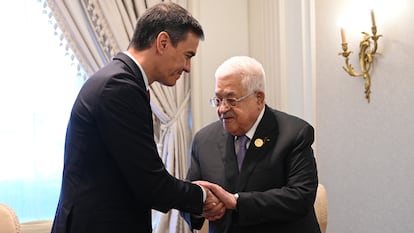Spain’s PM speaks with leaders of Jordan, Egypt and PNA to finalize recognition of Palestine
According to government sources the decision is imminent, although no specific date has been set yet

Spain’s Prime Minister Pedro Sánchez has intensified his round of contacts to prepare the final decision on the recognition of Palestine. According to several government sources, recognition by Spain could be imminent, although no specific date has been set. After a recent trip to the region with stops in Jordan, Saudi Arabia and Qatar, and a European tour that took him to Poland, Norway, Ireland, Slovenia and Belgium, Sánchez has held a series of telephone conversations with the King of Jordan, Abdullah II, the president of Egypt, Abdel Fattah el-Sisi, and the president of the Palestinian National Authority (PNA), Mahmoud Abbas.
These high-level contacts suggest an imminent decision to recognize Palestine, a move that Sánchez does not need to put to a vote in parliament since it is the exclusive power of the Cabinet. Even so, the Socialist leader has pledged to explain the decision in the Congress of Deputies and will try to attract as much support as possible across the political spectrum. The main opposition Popular Party (PP) has already said that it supports recognizing Palestine, but not the timing of Sánchez’s decision, which they see as hasty.
According to La Moncloa, the seat of government, these telephone conversations “give continuity to the round of contacts that the head of government made with the main actors in the region, as well as with other European countries, to promote a diplomatic solution that offers a horizon of peace, security and prosperity to the region through the recognition of Palestine as a State.”
Sánchez and his team closely followed the debate at the United Nations in New York, where they have also sought to attract allies to the cause of recognizing Palestine as a full member of the organization. The Spanish leader found common ground with Maltese Prime Minister Robert Abela, whose position on this matter is very similar and who also has the advantage of presiding over the U.N. Security Council this month. Abela, in coordination with Sánchez and other European leaders who support this solution, took advantage of that privilege to put Palestine’s full membership to a vote last week in the Security Council. As expected, the U.S. vetoed the decision, but there was significant support — 12 votes in favor and two abstentions — which according to the Spanish government’s view represents backing for Sánchez’s decision to recognize Palestine soon. Spain’s Minister of Foreign Affairs José Manuel Albares strongly defended full membership for Palestine and said that Spain’s decision to recognize a Palestinian state was already made and would be executed at the proper time.
Sánchez has always believed that the ideal situation would be for Western countries like Spain to recognize Palestine and for Arab countries to do the same with Israel, something that only a few have done, including Jordan and Egypt, two main actors in the talks. But it does not seem that any progress has been made in that direction in recent weeks, and even less so while the indiscriminate bombing of Gaza continues. Yet La Moncloa is determined to take the step of recognizing Palestine imminently, to the extent that it could play a relevant role in the campaign for the EU elections.
Around 140 countries have already recognized the State of Palestine.
Sign up for our weekly newsletter to get more English-language news coverage from EL PAÍS USA Edition
Tu suscripción se está usando en otro dispositivo
¿Quieres añadir otro usuario a tu suscripción?
Si continúas leyendo en este dispositivo, no se podrá leer en el otro.
FlechaTu suscripción se está usando en otro dispositivo y solo puedes acceder a EL PAÍS desde un dispositivo a la vez.
Si quieres compartir tu cuenta, cambia tu suscripción a la modalidad Premium, así podrás añadir otro usuario. Cada uno accederá con su propia cuenta de email, lo que os permitirá personalizar vuestra experiencia en EL PAÍS.
¿Tienes una suscripción de empresa? Accede aquí para contratar más cuentas.
En el caso de no saber quién está usando tu cuenta, te recomendamos cambiar tu contraseña aquí.
Si decides continuar compartiendo tu cuenta, este mensaje se mostrará en tu dispositivo y en el de la otra persona que está usando tu cuenta de forma indefinida, afectando a tu experiencia de lectura. Puedes consultar aquí los términos y condiciones de la suscripción digital.









































